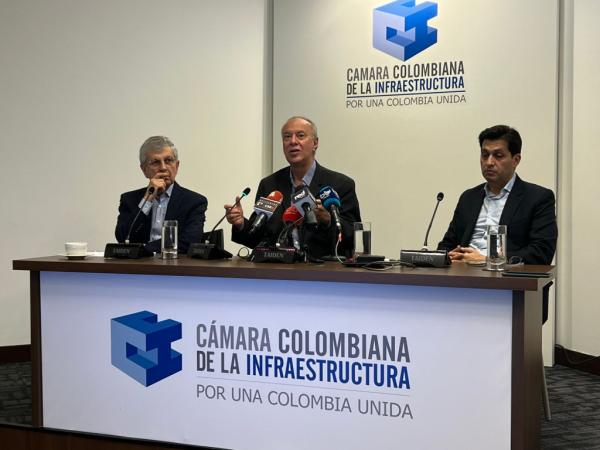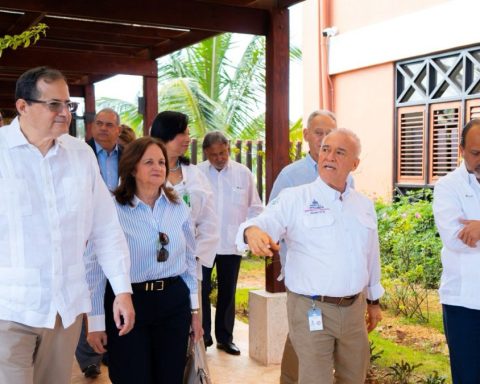Fedesarrollo carried out a study, at the request of the Colombian Chamber of Infrastructure (CCI), in which he gathered all the contributions of the concession model, or Public Private Alliance (PPP), in the development of infrastructure in the country, a document that also gives recommendations to take into account to continue strengthening this sector.
According to the study of Juan Benavides, Germán Lleras and Armando Montenegro, The progress of the sector at least in the last 25 years in the country has been thanks to private investment, and this scheme has made it possible to lift Colombia out of its road backwardness and attract the most remote regions to urban centers, said Juan Martín Caicedo. , president of the ICC.
(See: Invías awarded four projects from the Colombia Avanza program for $39,594 million).
However, in the presentation of the document, Fedesarrollo warned that the advances and contributions of private investment in PPP face the possibility of being severely limited by great uncertainty caused by the Government’s announcements in recent months, for example regarding the change of destination of future validity periods and the freezing of toll values.
“This uncertainty can cause delays, cancellation of new works, increase in the cost of credit and worsening of the country risk rating. A consequence of this situation would be that, according to the different scenarios modeled by Fedesarrollo (Benavides, Pabón and González 2023), there would be a decrease in long-term GDP growth of 0.5% below the potential of the base scenario (3.1%)”, they quote.
And they emphasize that, among the advantages of the model, is the completion of the worksThat is to say, while in public works projects there may be delays in activities or abandonment of them, since the responsibility falls on the shoulders of the concessionaires (with payment per completed section) the execution of the different routes will always be prioritized. . Furthermore, in this type of works, the environmental, governance and social responsibility axes are prioritized. They also highlighted that it is a model that allows freeing up State resources to invest in other sectors.
(See: Sacyr joins the list of interested parties in the second line of the Bogotá Metro).
“The aforementioned contributions have an enormous direct impact on connectivity and national competitiveness, but they reflect only a part of the benefits of the PPP model. With adequate risk allocation, good financial structuring and efficient project execution, the higher cost of private capital is compensated“, they point out.
Thanks to this, Lleras recalled that 3,000 km of roads have been built and the private sector is in charge of 9,000 km in the country. Today 2,000 km are dual carriageway. In addition, 72 tunnels and 1,190 viaducts and bridges have been built.
Furthermore, these investments in civil works and land transportation services have a broad multiplier effect on GDP, direct and indirect job creation, and tax collection. Each peso invested in civil works translates into an increase of $2.25 in national production, $2.46 in salaries and $4.90 in taxes. On the other hand, The multipliers for the ground transportation services sector are $2.20 in GDP, $2.53 in wages, and $7.91 in taxes.
(See: ANI publishes specifications to begin the modernization process of El Dorado).
In their accounts, between 2012 and 2024, the PPP model has mobilized an accumulated value of private financing of $70.05 billion in Capex and $71.24 billion in Opex (2023 values). Of this value, Lleras highlights that while 78% of these resources have already been executed (as of 2023), in the future terms of the projects, only 42% has already been paid to the concessionaires.
“Through the scheme, financing was obtained to achieve these works, which would not have been achieved if the public participation scheme had been in place. The State achieved this progress thanks to the payment method“added researcher Lleras.
Colombian pesos
Why do we have to maintain it?
Due to its benefits, they explain that the suspension of the PPP model or the modification of the conditions of ongoing contracts for the development of infrastructure, or a brake on the use of the model, would reduce the provision of good quality transportation infrastructure, given that there is no fiscal space to replace concessions with public works; would increase transportation costs; would reduce GDP growth, and impoverish the population due to the reduction of trade between regions and with the exterior and the higher cost of passenger mobility.
(See: Come back and play: intersection of opinions between Petro and Galán over works on the Bogotá Metro).
“Clear rules must be maintained that guarantee the sustainability of the model and the expansion of the country’s infrastructure. If the clear rules of the game are not maintained, access to credit will be more expensive, the country risk rating will worsen and the negative investment climate will drive investments away to other geographies. Far from weakening, the PPP model in transportation must be improved, consolidated and extended to other sectors so that the country continues to attract private investments that finance the quality public goods that the country’s development needs.“, they point out.
Furthermore, being able to use this model in large-scale projects that are important challenges allows us to generate trust with investors, which in turn translates into attracting more financing for the country not only in roads or different modes of transportation, but also in the creation of vertical infrastructure, such as educational or health centers.

Infrastructure
In the future
For experts, in addition to the previous recommendations, the planning processes, such as the Intermodal Transportation Master Plan (PMTI), They are essential for the prioritization and decision to advance new projects in the country that allow the development of the regions.
(See: Another 4G concession would be at risk of being liquidated: what will happen to the works?).
“The impact of the master plans requires the technical strengthening of the UPIT and the implementation of the CRIT. These two entities have a key role in the determination and location of the projects to be developed by PPP and public works. Likewise, they play a determining role in the regulation for setting rates and tolls for the country’s road infrastructure. To the extent that these entities operate in a modern way, and aligned with the functions established in Law 1682 of 2013 and decrees 946 and 947 of 2014, the way in which the benefits of the country’s new infrastructure reach a greater proportion of the population and achieve greater spatial coverage”, they quote.
Likewise, they highlight that the impacts would also be felt in the flow of projects and in costs for the treasury. Of the nine private initiative APPs, which do not receive support from the state and must be remunerated exclusively through the collection of tolls, would be paralyzed, with serious consequences for the affected regions and, through the limitation of the network, for the entire country.
“The weakening of the PPP model would reduce the speed of expansion of the transportation networks that the country needs, since there are no fiscal resources to finance investment in good quality infrastructure through public works.“, they point out.
Additionally, the suspension or withering of the PPP model would increase widespread transportation costs, reduce the speed of GDP growth, and It would impoverish the majority of the population, as a consequence of the reduction in trade between regions and abroad and the higher cost of passenger mobility.’ This would happen to the extent that this is the mechanism that in the last decade has allowed the expansion of the primary road network and for which there is no realistic and high-performance alternative from public works, they explain.
“Deepening the PPP model requires maintaining and improving the institutional and legal stability that the country has patiently and continuously built over the last two decades. It is essential to keep the rules clear and make explicit the government’s commitment to the sustainability and expansion of the model, which must be consolidated in transportation and extended to other sectors so that the country continues to attract private investments that help finance, build and maintain public infrastructure. quality”, they close.
PAULA GALEANO BALAGUERA
Portfolio

















